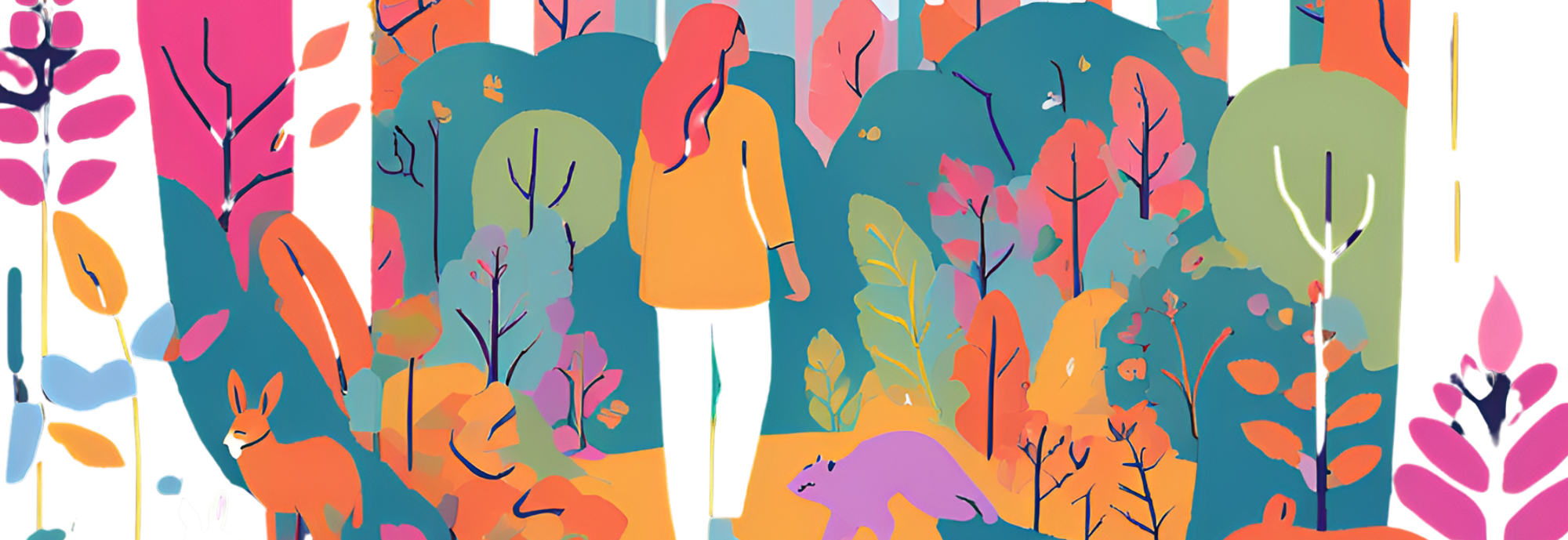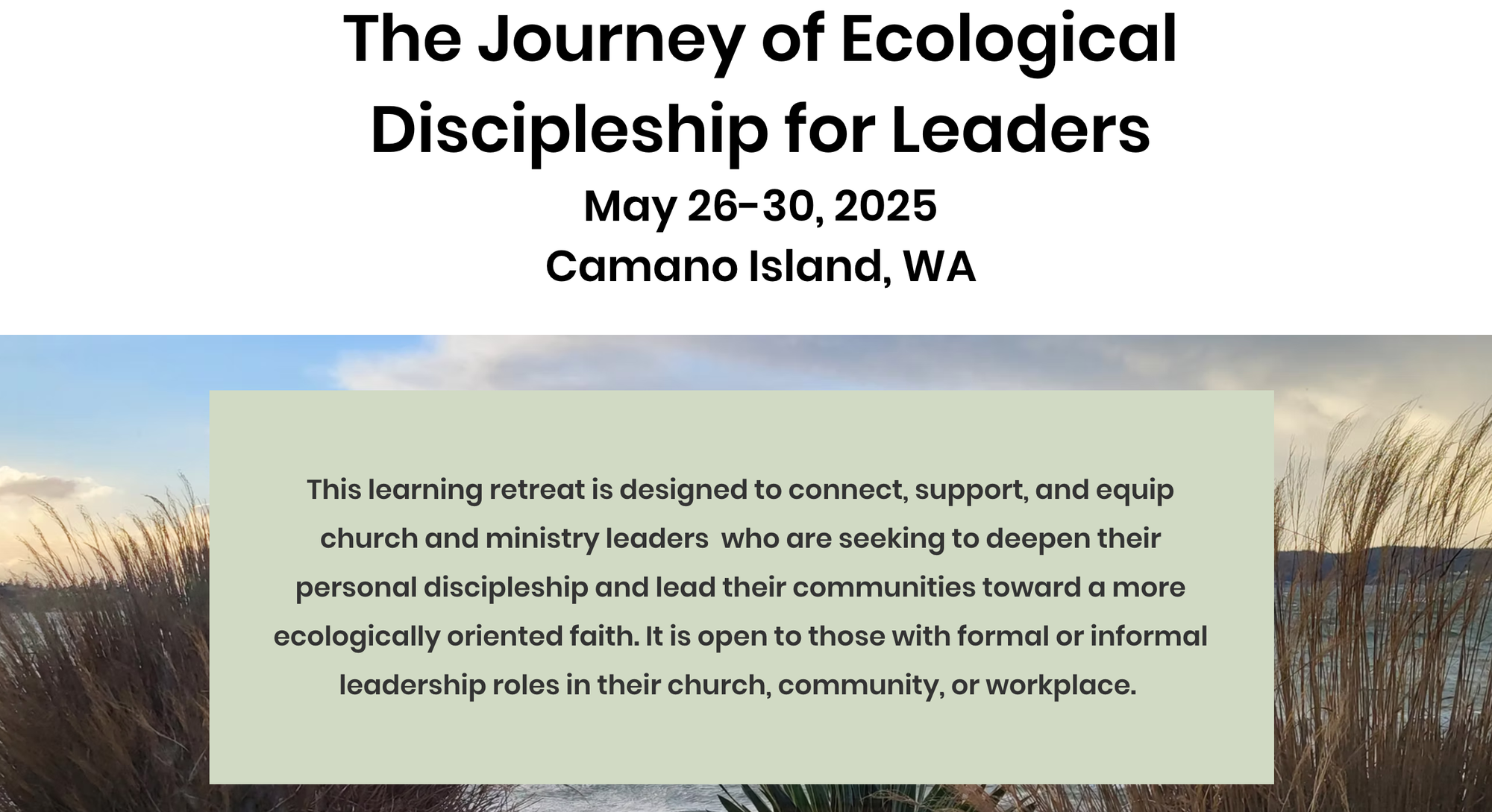This is the fourth piece in my series, “The Journey of Ecological Discipleship.” This piece introduces the eight stages in the journey - if you haven't had a chance to read the first three introductory pieces, you can find them HERE.
Thanks for reading! - James

Stage 1: Resist with Critique
While there is no set starting point for the journey, many take their first steps when they begin questioning and resisting the status quo. And even those who have traveled through all eight stages will eventually find themselves in this stage again. So, we begin here.
Each day brings more evidence of the ways in which we humans are warming the planet, degrading land and sea, reducing biodiversity, and hurting vulnerable people. In light of these crises, many followers of Jesus are asking critical questions about their faith and their faith communities. Such questions may include: What does the Bible have to say about the ecological problems we humans are causing? Why have many churches been slow to respond? Why do those who contribute the least to our environmental problems suffer the most from them? What cultural and political forces are invested in keeping things as they are? What needs to change? How have I contributed to the problem? How did we get to this point?
These critical questions lead to a clear conclusion: this is not the way it's supposed to be. For most people, it is at this point that clear sense of resistance begins to build. Those who are part of churches that ignore, minimize, or, in some cases, justify the harm done to creation may begin questioning those in authority and exploring more creation-centered theologies and faith communities. Others may dive into a particular ecological issue and learn about the people who are working to fix them. Most people will also turn their attention inward, assessing their own beliefs, attitudes and practices. Almost everyone begins to look for something to do - how do we fix this? Taking action is important, but for those who want to pursue deeper transformation, the most important step one can take is to enter the next stage.

Stage 2: Repent with Contrition
For ecological disciples, resistance leads to repentance. This includes reflecting on and expressing regret for the ways we have personally contributed to the problems we face, although it is more than this. Repentance in the fullest sense is a commitment to turn our lives and communities around, to reorient our values, priorities, and actions so they are in tune with God's heart and desire for creation. This involves saying "no" to much of the status quo, to turn away from cultural practices and theological systems that foster destruction and oppression. It also involves saying "yes" to alternatives - turning toward new forms of community, faith, and practice that nurture health, wholeness, and justice.
Repentance requires contrition; the deep feeling of remorse for wrongs that have been done. Though most of us would prefer to skip this part and move on, true sorrow turns us toward the pain and suffering of others, which for the ecological disciple includes the whole community of creation. Such sorrow softens our hearts and awakens our minds, helping us to see and feel more keenly what has been lost and who has been hurt. It also fortifies us for the journey ahead. When traveling through this stage, it is important not to rush. That said, eventually repentance requires us to get off our knees and get going. But to do so we must leave some baggage behind.

Stage 3: Release with Courage
To be open to new possibilities, it is important for ecological disciples to gather up everything that has rooted them in the status quo - the belief systems that grounded them; the communities that nurtured them; the path they were traveling on; the comforts and privileges that kept them safe - and release their grip on them. This does not mean that these things are of no value, or that they will not come back. They are released to God with trust that the Spirit will return what is needed and keep what is not.
People often find that there are a few things they are ready to release completely, like autumn leaves on a windy day. Other things may take more time to assess or be more difficult to let go. That is normal and understandable - holding our lives loosely is unsettling and a bit risky. Release takes time and courage. It puts our lives into the Creator's hands, making room within us for the transformative journey ahead. Letting go frees us to explore what comes next.

Stage 4: Rewild with Curiosity
When we release ourselves from what has held us, we are subsequently released to connect with and explore the wildness that runs through and surrounds us. This is rewilding, the process of rediscovering our existence as wild creatures within a wild creation. It entails exploring the wildness within each of us, dismantling the beliefs and practices that set us apart from creation. It also entails exploring the wider community of creation as participant, observer, and learner.
Rewilding requires curiosity, an openness to experience and explore life in ways that seek deep connection and understanding. Curiosity invites us to see ourselves, and the world, as infinitely interesting and full of mysteries - some that can be known and many that cannot. Ecological disciples are particularly curious to discover where God's presence has seeped into the wild spaces of our souls and landscapes, drawing us ever deeper into the Wild Mystery at the heart of creation. Rewilding retunes us to the symphony of creation and prepares our hearts and minds for new possibilities.

Stage 5: Reimagine with Childlikeness
Rewilding reminds us that God has created an open world, full of possibilities, and invites us into the important work of imagination. In this stage, ecological disciples explore new ideas for faith and practice. They ask, "What if...?", and see what possibilities emerge. They experiment with new practices, seeing what works and what does not without the pressure of getting it all right.
"Unless you change and become like children, you will never enter the kingdom of God" (Matt 18:3).
Engaging the imagination is an act of play and requires a childlike approach. In this stage, there is freedom to wonder and wander, to shed the constrictions and conventions that keep imagination in check. This playful engagement of our imaginations is joyful fun and serious work. As we move through this stage, specific ideas and practices begin to coalesce into a sense of calling - people begin to discover the particular changes they want to incorporate into their lives and communities. At this point, those on the journey may begin to think about the return journey, but there is still more traveling to do before the turn towards home.

Stage 6: Reintegrate with Coherence
In every journey, there comes a time to reflect on where we have been, what we have experienced, how we have changed, and how we have stayed the same. This is the work of reintegration, the process by which ecological disciples look back on the path they have travelled and remember the twists they encountered, the struggles they went through, the surprises they encountered, and the discoveries they made. They may begin to see how their relationship to creation and Creator has changed, sometimes in radical and surprising ways. They may also see how much they have changed and look on themselves with new eyes and grateful hearts.
Internally, this is a stage in which travelers seek coherence, the piecing together of experience into a unified whole. Coherence creates inner strength and peace that helps us find our place and role in creation. This does not mean that all questions are answered and the way forward is clear; more often than not, coherence comes from accepting reality in all its complexity and mystery. In the midst of such complexity and mystery, inner coherence reminds ecological disciples that they are welcome, loved, and called, and that this will not change no matter where the path ahead may lead.

Stage 7: Return with Courage
"We shall not cease from exploration
And the end of all our exploring
Will be to arrive where we started
And know the place for the first time."
T.S. Eliot, from “Little Gidding,” Four Quartets (Gardners Books; Main edition, April 30, 2001) Originally published 1943.
Most journeys of transformation eventually lead travelers back to where they began. But they do not come back the same person, and their home no longer looks the same. Going home after a time of change can be unsettling. Will it still feel like home? How do we tell people about our journey? Will our communities, especially those we love, accept the new us? Will we slip back into old identities and habits? What do we do now?
Like the releasing stage, returning requires courage. Those on the journey may discover they are no longer in the center of their community, and they may feel like outsiders. Relationships may need reexamining, repairing or reforming; some may need to be released. Those returning home have experiences, insights, and gifts to share, and it takes courage to do so without knowing for sure how one will be received. But chances are there will be at least a few people ready to listen and join in - companions for the new journey that begins when we return home.

Stage 8: Reform with Conviction
Having returned home, ecological disciples look for opportunities to share the story, raise awareness, and advocate for change. What to focus on and how to go about it will be unique to each person. Some people are comfortable standing up and standing out; they don't mind stirring things up and don't get too bothered by opposition. Some people are gatherers; they organize groups, build coalitions, and systematically create change that will last. Some people prefer behind the scenes work; they like to meet with people one-on-one, and they tend to get things done quietly without much attention.
A diversity of gifts and approaches are helpful and welcome in the work of reform; what ties ecological disciples together in bringing about change is conviction, the inner strength and fortitude that keeps reformers going in the face of opposition, loneliness, and fatigue. Having a strong sense of conviction doesn't mean bulldozing others or ceasing to listen and learn; it means trusting that the journey we have been on, the changes we have made, the hopes we carry, and the new ideas we share are worth pursuing today and tomorrow. Such conviction is rooted in love, which is offered freely and generously to the places and people we call home.
Two Important Additions
While traveling through the eight stages, which may happen in a linear fashion or more haphazardly, it is important to take time for Rest with Celebration. The Journey of Ecological Discipleship can be long and tiring; it is important to remember God's call to regular rest - Sabbath - which allows travelers to pause their striving, connect with creation, and rest in God's grace and provision. Such rest also invites us to celebrate the inherent goodness of the world, and all the ways God blesses our lives and our journeys.
It is also important to remember that this pilgrimage is never really complete - it is a journey that travelers Repeat with Consistency. Ecological disciples who go through the eight stages and return home will, at some point, hear the call to get up and go again. Our lives and communities may have slid again into stagnation; there may be something new for us to discover; we may be called to lead others on the journey.
Each journey we take will be different, but the more people move through the stages, the more the terrain becomes familiar, enabling those who continue down the path to receive the transformative gifts that await.
With you on The Way,
James
SPECIAL INVITATION: If you are on the "Journey" and trying to figure out how to bring others along with you in your church, ministry, or community, consider an upcoming learning retreat Circlewood is hosting on Camano Island. We will explore the stages in more depth, with special focus on your personal discipleship and leadership context. If you want to learn more, click on the image below.
